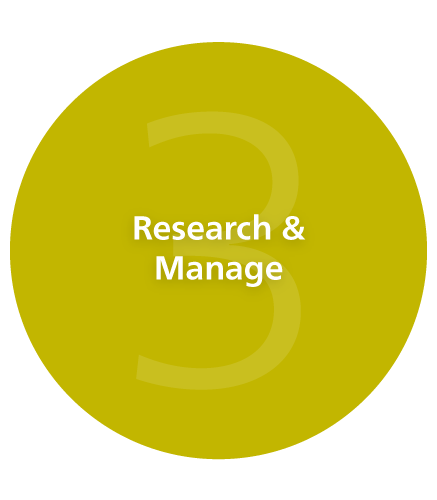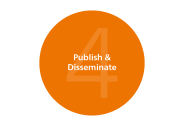Research & Manage

Data collection, processing and analysis is at the core of every research project. Successful implementation also requires project management tasks, including project reporting and other communication with the funder.
Data collection and analysis
The research landscape encompasses a diverse array of disciplines and methodologies. In empirical research, you will collect and analyze a collection of facts or statistics: qualitative or quantitative data. In theoretical research, the collection and analysis of data may take diverse forms, such as examining existing literature, formulating hypotheses, and engaging in critical discourse within the academic community. Disciplines such as theoretical physics, philosophy, and other conceptual domains often rely on abstract reasoning, mathematical models, thought experiments, and philosophical frameworks to advance knowledge and generate new insights. Theoretical frameworks provide the intellectual foundation upon which empirical research often builds by guiding the formulation of research questions and the interpretation of findings.
The processes of data collection and analysis are both strongly connected to the methodology developed in the Conceptualize & Submit phase (see the Develop methodology tab) and the resources and contracts planned and established in the Conceptualize & Submit and Plan & Prepare phases (see the Define partners and your team tab, the Identify facilities and resources tab, and the Conclude contracts with partners tab). This step mirrors what you have prepared in the Data Management Plan (DMP), including monitoring the quality of the data and managing data protection if relevant.
Normally, the principal investigator (PI) is responsible for managing the data from collection through publication to long-term archiving. This involves ensuring that their team observes all the relevant regulations and good research practice during the data management process.
Tools and infrastructure
Please contact your supervisor, research group, institute or faculty to learn about the services and infrastructures for data collection that are directly available to you.
UniBE Core Facilities
The Core Facilities offer various state-of-the-art research-services and infrastructure to researchers at UniBE and the Inselspital. The expertise and infrastructure at the Core Facilities can support you in conducting your research project.
Online tools and software
If you want to manage your research data collaboratively, these online tools can support your goals.
The University Library offers discipline-specific overviews of online tools on the Subject information page: click on one of the disciplines under Portals and scroll down until you find the Tools tab; more information is available on the German version of the page.
Many institutes and research groups hold domain-specific software licenses. Discuss with your team what software would support your data collection and analysis. The IT Services show what software is already available and licensed for UniBE members. If you think you will need to procure transversal software that could be of use to several domains at the UniBE, please contact the Research Management Office.
REDCap (Research Electronic Data Capture)
REDCap is a secure web platform for building and managing online databases and surveys. REDCap's streamlined process for rapidly creating and designing projects offers a vast array of tools that can be tailored to virtually any data collection strategy.
REDCap provides automated export procedures for seamless data downloads to Excel and common statistical packages (SPSS, SAS, Stata, R), as well as a built-in project calendar, a scheduling module, ad hoc reporting tools, and advanced features, such as branching logic, file uploading, and calculated fields.
The centrally hosted web application is available to members of the University of Bern and Inselspital for the creation and use of research databases. All services for REDCap are provided by the Department of Clinical Research (DCR) and the system is hosted centrally by IT Services Office. Free monthly REDCap training courses are offered to researchers.
High-performance computing and data science
The IT Services are operating a high-performance computing (HPC) cluster to support scientific computing at the University of Bern. The cluster is available to all researchers having a demand for high computing power.
For data science projects, the Data Science Lab (DSL) offers another partner for planning and implementation. They provide University-wide support and training in data science, machine learning, artificial intelligence, and research-IT-related matters.
Digital Scholarship
The University library provides support for digital, data-driven methods such as data analysis, machine learning, and big data technologies by making data and tools available and educating and offering guidance on their use.
Considerations and regulations
Please note the ethics compliance requirements that apply to data management and security during this phase.
Open research data practices should be observed wherever possible at all stages of your research data management. Please note the compliance and good research practice requirements for open science, open access, and open research data, and contact the Open Science Team at the University Library for information and support. The findability, accessibility, interoperability, and reusability (FAIR) guiding principles for scientific data management and stewardship can guide you through the data management process, improve the reproducibility of your research, and enhance the credibility of your research output.
Document your research

Comprehensive documentation is essential to enable correct interpretation and reuse of the data at a later date. Among other things, the documentation should include details about the time and place the data was collected, the methods, tools, software and statistics models used, as well as information about the parameters chosen and any missing values, along with nomenclature and acronyms. This information can be added complementary to your dataset, e.g., in the form of supplementary documentation in a ReadMe file.
The Open Science Team provides more information on documentation.
Data organization and preparation
Your data has been collected and analyzed. Now you need to prepare the data for interpretation and make it fit for sharing and reuse in other projects and research groups. Files need to be organized, named, and formatted and versions controlled. Documenting your data and data sets and including your study protocol both shows transparency and supports the re-use of your data.
In theoretical research, “data” may consist of theoretical models, mathematical formulations, conceptual frameworks, and philosophical arguments. These “data” are often not captured in the same way as empirical data and may not require the same level of organization and formatting. Instead, the emphasis may be on clearly articulating the theoretical underpinnings of the research, presenting logical arguments, and engaging in critical discourse within the academic community. However, even theoretical research benefits from adopting practices that promote transparency and facilitate the sharing and reuse of research output. This may include documenting the theoretical assumptions, methodologies, and reasoning processes employed in the research. By providing clear documentation and explanations, researchers can enhance the reproducibility of their work and support the advancement of knowledge within their fields.
Therefore, although the specific practices for preparing and documenting data may vary across research disciplines, the underlying principles of transparency, reproducibility, and openness to sharing research outputs remain relevant.
Services and advice
The Open Science Team at the University library supports you for questions regarding the handling of documentation and metadata.
Considerations and regulations
Depending on your methodology, requirements for documenting the data collection and analysis differ. Please contact the following discipline-specific support units:
Discipline |
Support unit |
|---|---|
Health & Life Sciences |
Department of Clinical Research University library support for: |
Data Science |
|
Social Sciences & Humanities |
University library support for:
|
Natural Sciences |
University library support for: |
Subject-specific support |
Subject-specific support services of the University library (from A like Agriculture to V like Veterinary medicine) |
Research data management
Knowing how to organize and manage research data is one of the most important prerequisites for the quality, security, durability, and reproducibility of research data, both during a research project and afterwards. This is relevant to both empirical and theoretical research, although it manifests differently in each type of research.
Services and advice
The Open Science Team has much information, services, and infrastructure available to UniBE members. It advises individually and in groups, among others on the following topics.
- Open data
- Open access
- Data management
- Requirements of research funding institutions
- Rights, licenses
- Funding
- Publishing journals, books, and dissertations
- Project information
Tools and infrastructure
The University library lists useful tools in Research Data Management.
Travel and research abroad
It might be helpful or even necessary to travel abroad for a certain amount of time during your research, for instance, to collect data, to conduct interviews or on-site observations, to access documents, archives or libraries, to participate in fieldwork, or to exchange with colleagues. For information on travelling for the purpose of conference attendance, please visit the Scientific conferences tab in the Publish & Disseminate phase.
If your travel costs are higher than expected or you have unforeseen travel that was not included in your original budget, you may be able to move money between budget categories, up to the maximum awarded amount. If this is not possible, you could search for supplementary funds specific for travel in one of the databases outlined on the Select funding tab (in Tools and infrastructure).
Services and advice
You will find general information on how to prepare for a trip abroad under Information about preparing for a trip (Uni intern) on the UniBE Travel platform.
For general advice concerning travelling abroad, your supervisor, faculty, or institute should be your first point of contact. Otherwise, UniBE International might also be of help.
If you are travelling to countries with a questionable safety situation, please contact the Security Office. Security concepts should be designed early on in the process: often, grant providers will want to see first thoughts at the proposal stage).
Some faculties have funds available for travel costs. The University has limited funds available for research stays abroad:
- UniBE Doc.Mobility – Funds for PhD students who are not funded by the SNSF to undertake a 6-12 month research stay at a university or research institution abroad.
- UniBE Short Travel Grants for (Post)Docs – Up to CHF 8,000 for PhD students, early and advanced postdocs, and senior research assistants to undertake a 2-8-week research stay abroad.
Tools and infrastructure
UniBE International provides a list of summer and winter schools which may be relevant to you or to members of your project team.
They also provide information on the possibilities for travel through the ERASMUS staff exchange program and a map showing staff exchange and research agreements that exist between UniBE and institutions abroad.
To book your trip abroad, please use the UniBE Travel platform.
Considerations and regulations
Important!

Please consult the UniBE Regulations on business travel (in German). If your research is funded by a US federal agency, please also consult the infosheet by the Grants Office on charging travel costs to US grants.
If you are planning secondments (research stays) abroad, please contact the person responsible for human resources in your secretariat well in advance to discuss the tax and insurance implications. If necessary, they will then contact the UniBE Human Resources Office.
If you travel with export-controlled goods (such as dual-use items, technology, or software, even if only stored on the electronic device you are carrying with you), please contact the UniBE Export Control Contact Point.
Safety in research
The University of Bern ensures safe and healthy working conditions and promotes an exemplary safety and error culture. Excellent research and the protection of employees and the environment are inextricably linked. To ensure the best possible working conditions, it is essential that all employees familiarise themselves with the applicable safety standards (laws, university directives, laboratory rules, etc.) and that supervisors fulfil their management duties and responsibilities.
Services and advice
Depending on the risk potential, all institutes have appointed contact persons for general safety, biological safety, chemical safety and radiation protection. These authorised persons are supported by the Security Office, which draws up guidelines, offers training and advises the authorised persons on site in all areas. In addition to the topics already mentioned, the Security Office has expertise in the areas of occupational medicine, threat management, hazardous goods transport, emergency management, travel safety, hazardous waste disposal and insurance management.
The contact persons for each institute can be found on Uni intern under „Dienstleistungen – Sicherheit – Allgemeines – Organisation“ (only in German).
The entire service portfolio of the Security Office and all relevant information on the topics can be found on Uni intern under „Dienstleistungen“ – „Sicherheit“ (only in German).
Emergency number

A 24/7 number is available for crisis situations:
+41 31 684 55 55.
Considerations and regulations
All relevant directives, guidelines and information sheets on all safety-related topics can be found here.
Under ‘Guide / Documents’ you will find general information sheets as well as some institute-specific safety rules and specification documents on the topics of occupational safety, health protection, emergency management and environmental safety.
Reporting
Reporting to the funder on research findings, the status of the work, and project finances is a crucial aspect of the research process that ensures transparency and accountability. Regardless of the research discipline or funding source, you are expected to provide clear and comprehensive reports, usually at various stages of the research project and certainly at the very end. Below is a general overview. Always consult the contract or agreement with the funder for specific details.
Progress Reports
You may be required to submit progress reports to the funding agency at regular intervals during the project. These interim reports provide updates on the status of the project, including milestones achieved, challenges encountered, and any deviations from the original plan. Scientific and financial progress reports help funding agencies monitor the use of funds, assess the project’s progress, and identify any issues that may need to be addressed. Many funders pay in installments and must sign off on reporting for the next payment to be released.
Data Management Plans
Many funding agencies now require you to include data management and sharing plans in their grant proposals (see the Develop methodology tab). If your project is required to have a data management plan, you may also need to update it during the project.
Research Findings and Publications
Upon completion of the research project, you are expected to report your findings through publications in peer-reviewed journals, conference presentations, and other dissemination channels. For further information, consult the Publish & Disseminate phase.
Final Reports
At the conclusion of the research project, you are typically required to submit a final report to the funding agency. This report summarizes the key findings, achievements, and outcomes of the project and any challenges or lessons learned. Final reports may also include recommendations for future research directions and policy implications arising from the research findings. A final financial report is also usually required. Some funders withhold the final payment until they have approved the report.
Discipline-Specific Reporting Guidelines
Some research disciplines may have specific reporting standards or conventions that researchers are expected to follow. For example, in medical research, researchers often adhere to reporting guidelines such as the CONSORT 2010 statement for clinical trials, the STROBE statement for observational studies, and for systematic reviews, the PRISMA 2020 statement. It is important for researchers to familiarize themselves with the reporting guidelines relevant to their discipline and ensure compliance in their reports.
Problem solving

During your project, you may need to solve various issues: related to your budget, your team, contractual issues, compliance issues, etc. For externally funded projects, some issues may need to be discussed directly with the third-party funder. If you are unsure, please contact the Grants Office. For all other projects, please contact the Research Management Office.


